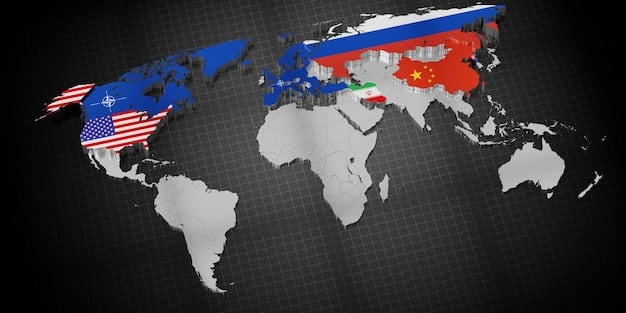Decoding US Sanctions on Russia: Impact on Global Economy

Decoding the Latest US Sanctions Against Russia: What It Means for the Global Economy involves analyzing the complexities of these measures and their potential ripple effects on international trade, financial markets, and geopolitical stability.
The **decoding the latest US sanctions against Russia: what it means for the global economy** requires a close examination of the motivations behind these actions, the specific sectors targeted, and the potential implications for businesses, consumers, and governments worldwide.
Understanding the Rationale Behind US Sanctions on Russia
The United States has a long history of imposing sanctions on Russia, often in response to perceived transgressions of international law or human rights. Understanding the rationale behind these sanctions requires examining the geopolitical context and specific events that trigger them.
Historical Context of US Sanctions
Sanctions against Russia are not a new phenomenon; they date back to the Cold War era. However, the nature and intensity of these measures have evolved over time.
Triggers for Recent Sanctions
Recent sanctions have been triggered by a range of events, including alleged interference in foreign elections, cyberattacks, and actions in Ukraine.
- Annexation of Crimea in 2014
- Alleged interference in the 2016 and 2020 US elections
- Cyberattacks targeting US infrastructure
- Human rights concerns and political repression
By understanding these triggers, we can better anticipate potential future sanctions and their likely impact on the global economy.

Analyzing the Specific Sectors Targeted by Sanctions
US sanctions on Russia often target specific sectors of the Russian economy, such as energy, finance, and defense. Analyzing these targeted sectors helps to understand the intended impact and potential effectiveness of the sanctions.
Energy Sector Restrictions
The energy sector is a key target of US sanctions, given Russia’s reliance on oil and gas exports. These restrictions can limit Russia’s ability to generate revenue from its energy resources.
Financial Sector Limitations
Sanctions on the financial sector can restrict Russia’s access to international capital markets, making it more difficult for Russian companies and the government to raise funds.
- Restrictions on US banks dealing with Russian entities
- Limitations on access to US dollar-denominated financing
- Freezing of assets held by sanctioned individuals and companies
Targeting these vital sectors aims to exert economic pressure on Russia and limit its ability to pursue certain policies.
The Impact on International Trade and Investment
US sanctions on Russia can have a significant impact on international trade and investment, affecting businesses and consumers worldwide. Understanding these effects is crucial for navigating the complex global economy.
Disruptions to Trade Flows
Sanctions can disrupt trade flows between Russia and other countries, leading to higher costs and reduced availability of certain goods and services.
Reduced Foreign Investment
The uncertainty created by sanctions can deter foreign investment in Russia, leading to slower economic growth and fewer job opportunities.
- Increased risk perception among investors
- Compliance costs for businesses operating in Russia
- Potential for retaliatory measures from Russia
These disruptions and reductions in investment can have cascading effects throughout the global economy, affecting supply chains and consumer prices.
Geopolitical Implications of US Sanctions
US sanctions on Russia have significant geopolitical implications, affecting relations between the two countries and the broader international order. Examining these implications is essential for understanding the broader context of the sanctions.
Strained US-Russia Relations
Sanctions often lead to strained relations between the US and Russia, increasing tensions and reducing cooperation on other global issues.
Impact on International Diplomacy
Sanctions can complicate international diplomacy, making it more difficult to resolve conflicts and address shared challenges.
- Potential for Russia to seek closer ties with other countries
- Reduced cooperation on issues such as arms control and counterterrorism
- Increased polarization in international forums
These geopolitical implications can have long-lasting effects on the global political landscape.

Potential for Retaliatory Measures by Russia
In response to US sanctions, Russia may take retaliatory measures, further complicating the global economic landscape. Considering these potential retaliatory actions is crucial for assessing the overall impact of the sanctions.
Counter-Sanctions
Russia may impose counter-sanctions on US companies and individuals, limiting their ability to do business in Russia.
Cyberattacks
Russia may engage in cyberattacks targeting US infrastructure and businesses, causing economic disruption and undermining confidence.
- Increased surveillance and intelligence gathering
- Disinformation campaigns to undermine public trust
- Potential for military escalation in certain regions
These retaliatory measures can escalate tensions and exacerbate the economic impact of the sanctions.
Assessing the Effectiveness of US Sanctions
Determining the effectiveness of US sanctions on Russia is a complex task, requiring careful analysis of their impact on various economic and political indicators. A critical assessment helps to understand whether the sanctions are achieving their intended goals.
Economic Impact on Russia
Sanctions can have a mixed impact on the Russian economy, depending on the specific measures imposed and the resilience of the Russian government and businesses.
Political Impact on Russian Policies
The extent to which sanctions influence Russian policies is a subject of debate, with some arguing that they can be effective in altering behavior, while others believe they are largely ineffective or even counterproductive.
- Alignment of allies in implementing sanctions
- Ability of Russia to find alternative sources of financing and trade
- Potential for unintended consequences and negative spillover effects
A comprehensive assessment of the effectiveness of sanctions requires considering multiple factors and perspectives.
| Key Point | Brief Description |
|---|---|
| 🎯 Targeted Sectors | Energy, finance, and defense sectors are primary targets. |
| 📉 Trade & Investment | Disruptions in trade flows and reduced foreign investment. |
| 🌍 Geopolitical Impact | Strained US-Russia relations and complicated diplomacy. |
| 🛡️ Retaliatory Measures | Potential counter-sanctions and cyberattacks from Russia. |
Frequently Asked Questions
▼
The primary goals include deterring aggressive actions, upholding international law, and promoting human rights by limiting Russia’s financial and technological capabilities.
▼
Sanctions can lead to increased inflation, reduced access to goods and services, and limited job opportunities, ultimately affecting the living standards of ordinary Russians.
▼
Russia is increasingly looking towards markets in Asia, particularly China and India, to diversify its trade relationships and mitigate the impact of Western sanctions.
▼
The effectiveness is debated; some argue that sanctions have limited impact, while others believe they create pressure for policy adjustments over the long term, depending on enforcement.
▼
The cooperation of international allies is crucial; unified action amplifies the impact of sanctions, while divisions can weaken their effectiveness and allow Russia to find loopholes.
Conclusion
Decoding the latest US sanctions against Russia: what it means for the global economy requires a nuanced understanding of their rationale, targeted sectors, and potential implications. While these measures aim to deter aggressive actions and uphold international norms, they also carry significant risks, including disruptions to trade, strained geopolitical relations, and the potential for retaliatory measures. Assessing the true effectiveness of sanctions requires careful analysis of both their economic and political impact, considering the resilience of the Russian economy and the broader international context.





